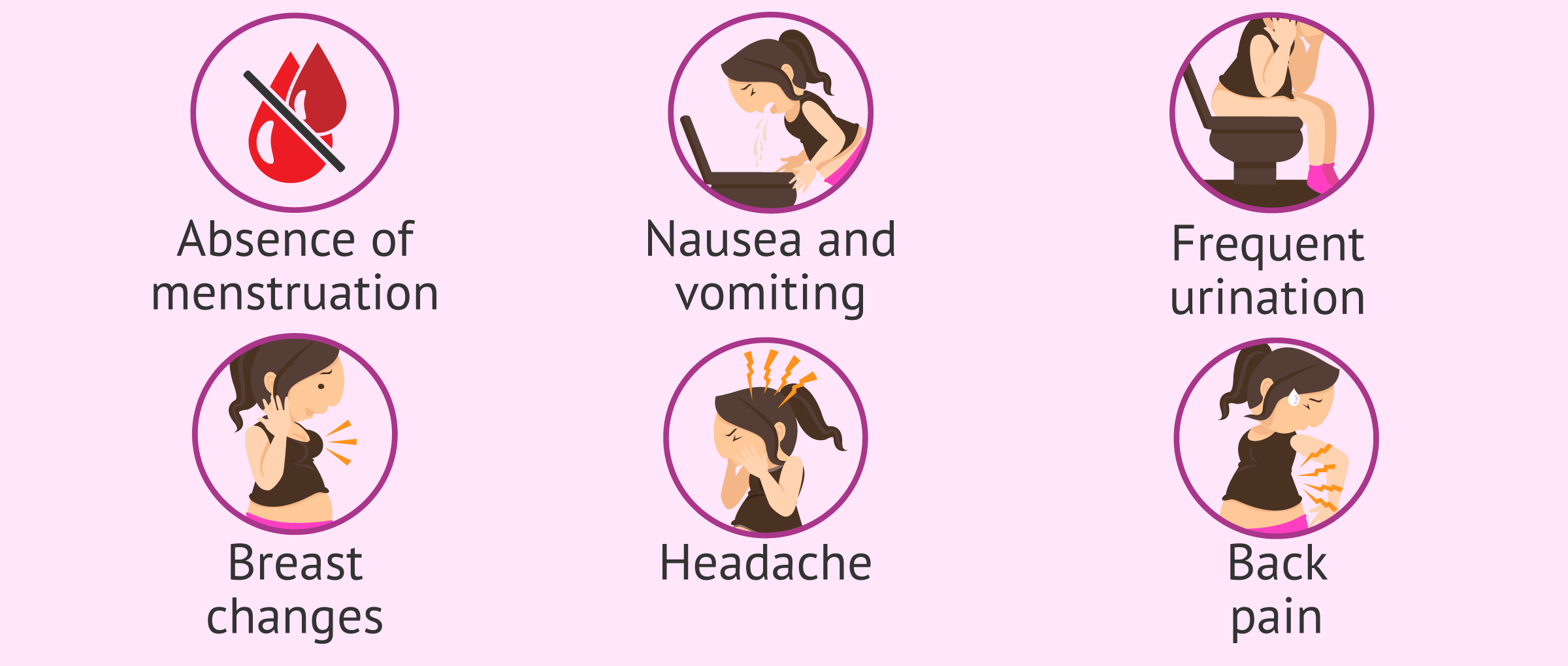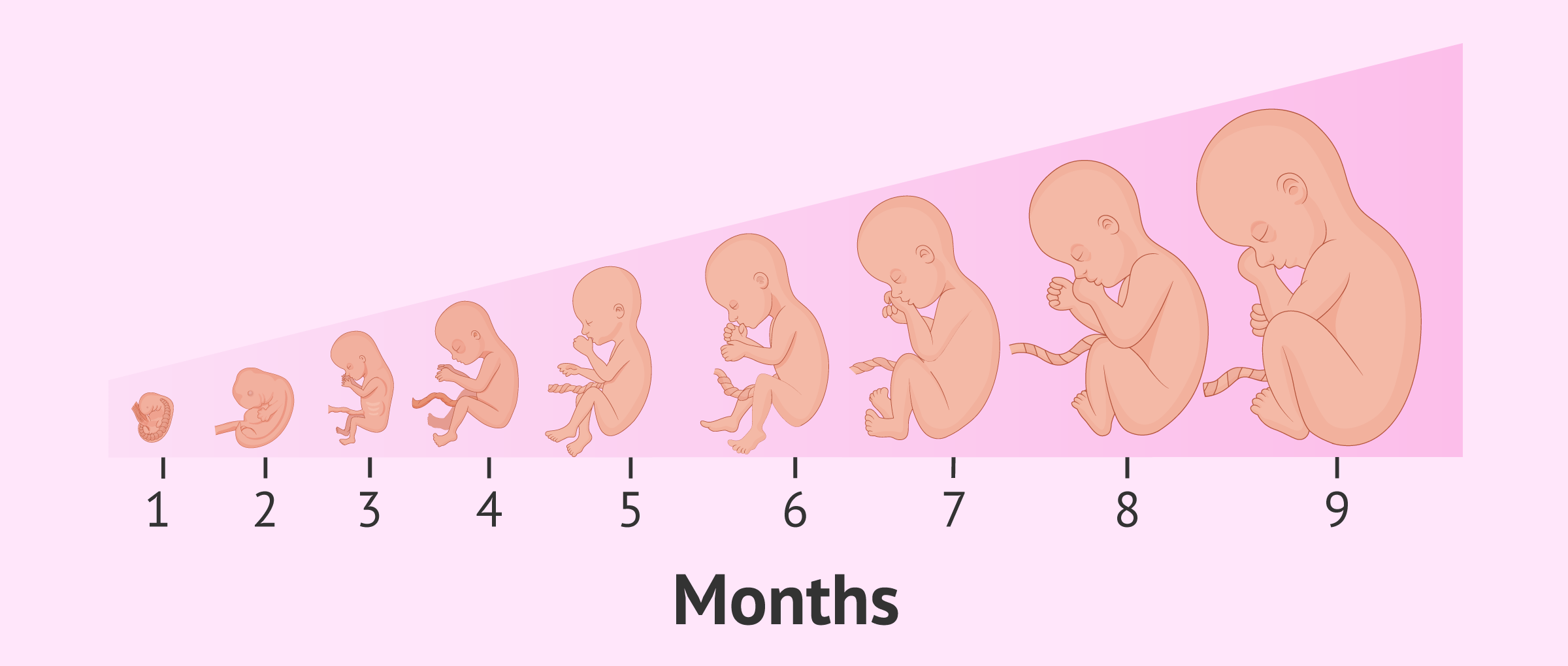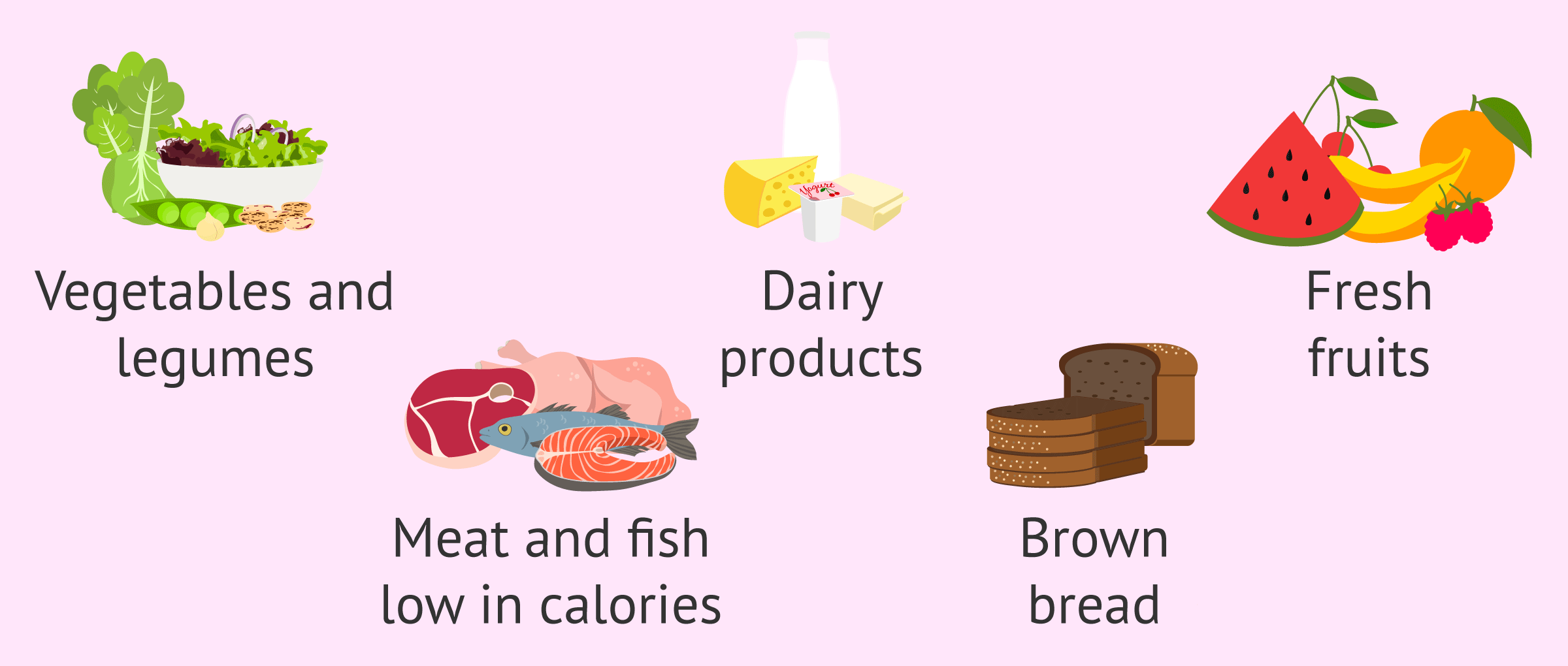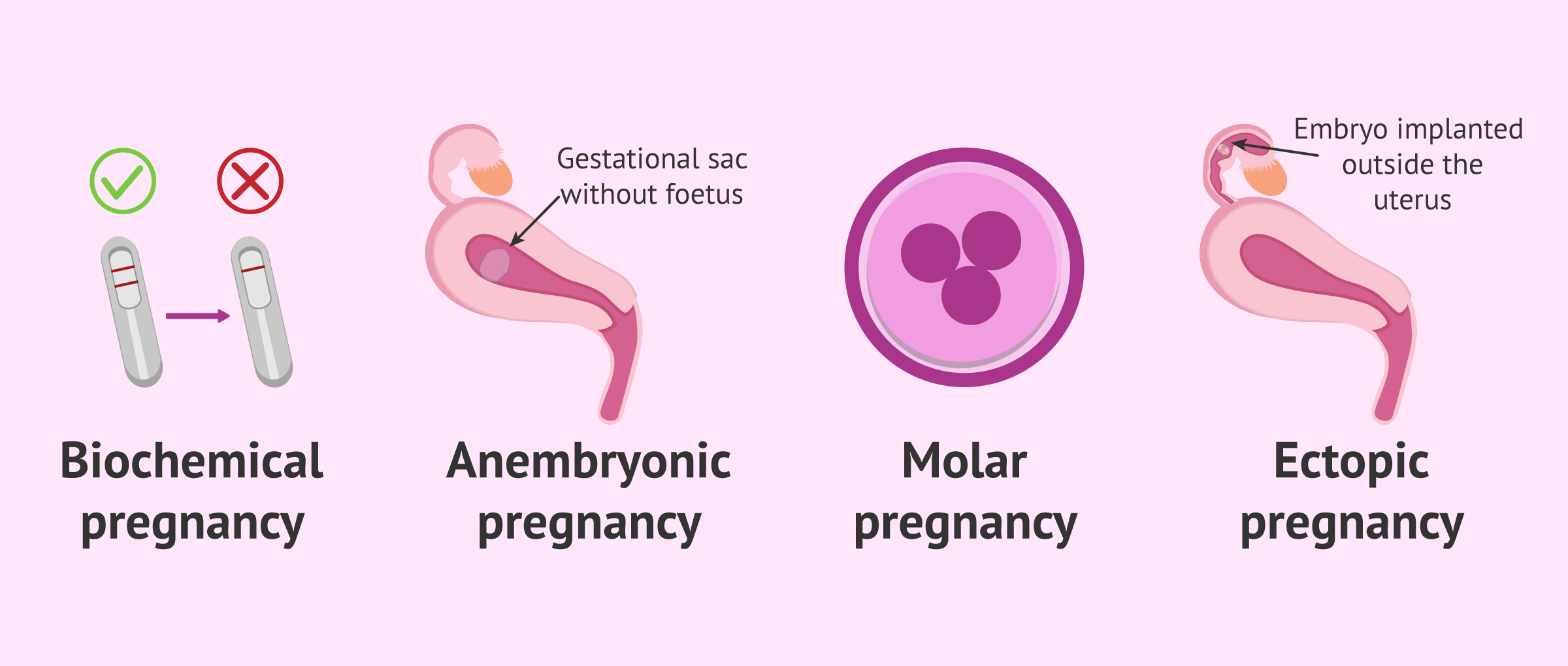Pregnancy is the period from conception to the birth of a baby. It covers approximately 9 months, although specialists prefer to count gestation by weeks.
Since the exact time of implantation of the embryo in the uterus is unknown, pregnancy is considered to begin with the your last menstrual period. From now on, 40 weeks of fetal development will pass until delivery.
During all this time, you will experience numerous physical and emotional changes as a result of hormonal variations. These changes will result in different symptoms depending on the stage of pregnancy. However, every woman is different and so is every pregnancy, so not all pregnant women will show the same symptoms.
Provided below is an index with the 9 points we are going to expand on in this article.
- 1.
- 2.
- 2.1.
- 3.
- 4.
- 5.
- 5.1.
- 6.
- 6.1.
- 6.2.
- 6.3.
- 6.4.
- 7.
- 8.
- 9.
What are the most common pregnancy symptoms?
The pregnancy symptoms experienced by each woman may appear at different times and with greater or lesser intensity depending on the conditions of each one.
In fact, there are those who feel changes in their organism from the first days and those who do not notice anything different until a more advanced stage of gestation.
The following are the most common symptoms of pregnancy:
- Missing menstruation due to interruption of menstrual cycles.
- Weight gain as gestation progresses
- Nausea and vomiting in the first trimester.
- Swelling and heaviness in abdomen, legs, face, and feet, most notably in the last months.
- Tiredness and fatigue.
- Increased urge to urinate
- Greater fluid retention.
- Changes in the shape, tenderness, and size of breasts and nipples These changes are taking place in view of future breastfeeding.
- You will also note increased olfactory sensitivity, increased appetite and the appearance of cravings.
- Also stretch marks appear as your abdomen grow.
These are general pregnancy symptoms, but the variation in hormones can affect each pregnant woman differently and lead to different symptoms. You can read more about this in the following article: Pregnancy symptoms.
Pregnancy month by month.
Gestation begins with fertilization and implantation of the embryo after unprotected sex on a woman's fertile days.
After the arrival of the sperm into the fallopian tubes, one of them fuses with the mature egg that has been expelled from the ovary. The embryo resulting from this union descends down the tube to the uterus, where it attaches to the endometrium and initiates fetal development and pregnancy. From the moment of implantation, both the mother and the embryo begin to undergo changes.
If you would like to know more information about each of the months of pregnancy, we recommend you to read this article: Pregnancy Stages by Month - Fetal Development with Pictures.
Fetus Development
Embryo implantation usually takes place around the fourth pregnancy week. At this time, the embryo is a circular disc of about 2 mm.
During the second month organogenesis begins: the spinal cord, brain, heart, intestine and skin are formed. The eyes, ears, nose and upper lip also appear.
In the third pregnancy month, the embryonic period ends and the fetal stage begins. The embryo is renamed fetusat exactly 10 weeks, when it's about 8 cm.
Male or female genitalia form during the third month of gestation. However, it is still difficult to define sex by ultrasound and there can be confusion.
Although the fetus begins to move inside the uterus at an earlier stage, the mother will not be able to feel it until about the fourth month of pregnancy, at which time it measures about 15 cm.
In the sixth month, the fetus reaches 32 cm, opens its eyes and can perceive light. Hair also appears, as well as eyebrow and eyelash hairs.
At this point, the fetus begins to develop a certain pattern of activity and sleep. The mother can perceive how the fetus responds to loud noises and music, moving with energy thanks to muscle development.
The lungs fully develop in the seventh month of pregnancy. Fat also begins to accumulate in the fetus, which will allow you to regulate your body temperature autonomously after birth.
In the eighth month, the fetus gains considerable weight. It grows up to 42 cm and its ability to move is limited. In addition, olfactory neurons form in the brain and the fetus begins to perceive strong odors.
In the last month of pregnancy, the fetus descends through the pelvis and fits its head into it. All his organs are now functioning autonomously and he is ready to be born.
Ultrasound
Ultrasound is a diagnostic imaging technique based on the emission of ultrasound by a probe. The ultrasounds penetrate the skin, thanks to the use of an aqueous gel, and allow to reach the vision of the fetus, which is reflected in the ultrasound.
This is one of the most important tests during pregnancy. In fact, it is necessary to perform several ultrasounds throughout the gestation to ensure that everything is correct and that the fetus continues its normal evolution.
There are two ways to perform ultrasounds:
- Transvaginal ultrasound
- is performed during the first trimester of gestation and, although it is more uncomfortable for the woman, it also allows images to be obtained with more detail.
- Abdominal ultrasound
- it is done in the second and third trimesters of pregnancy. It is usually advisable for you to come to the consultation with a full bladder for a clearer image.
Ultrasound allows an exhaustive control of the pregnancy, as it allows us to know parameters such as the following: the male or female sex of the future baby, the position of the foetus, the amount of amniotic fluid, the evaluation of the placenta, the presence of morphological anomalies, etc.
Three ultrasounds are routinely performed throughout pregnancy, one for each trimester. Specifically, it is most usual to do an ultrasound at weeks 12, 20, and 36. However, it is possible to have more ultrasounds if you wish or if the doctor tells you to.
Today, in addition to the classic two-dimensional ultrasound, there are 3D ultrasound and 4D ultrasound, which provide a more realistic image of the fetus.
For more information, we invite you to read the following article: Ultrasound scans of the fetus.
Diet During Pregnancy
Controlling the diet during pregnancy is essential for the fetus to receive the necessary nutrients and to develop normally.
The diet should be varied and balanced. In addition, it is advisable to include foods such as the following:
- Milk and dairy products for calcium intake.
- Raw (previously washed) and cooked fruits and vegetables that provide vitamins such as folic acid.
- Wholemeal bread and cereals rich in fibre.
- Meat and fish with low calorie content, which provide iron, omega-3 fatty acids, etc..
In addition, it is advisable to reduce the consumption of products high in saturated fats, carbonated beverages and caffeine.
Alcoholic beverages and other harmful substances such as tobacco, which could endanger pregnancy and/or seriously affect the health of the future baby, are completely banned.
It is also very important to pay attention to foods that should not be eaten in order to avoid infection by toxoplasmosis or listerosis. Therefore, during pregnancy it will not be possible to eat raw meat, fish and shellfish, undercooked eggs, unpasteurized cheese, etc.
If you have a specific abnormality, such as diabetes, being overweight or anemia, it is advisable to consult your doctor if you need to follow a special diet.
If you want to know in detail what to eat in pregnancy, we recommend you to read the following post: Pregnancy diet
Complications
Pregnancy is a special state of the woman's body, which undergoes many changes and, therefore, can sometimes result in some unwanted complications that compromise pregnancy.
Gynecological check-ups aim to diagnose any risk to the fetus as the pregnancy progresses. However, it is not always possible to prevent an abortion or other alteration in normal gestational development from occurring.
Some examples of complicated situations related to pregnancy are the following:
- Preeclampsia
- alteration characterized by high blood pressure.
- Placenta previa
- refers to the lower position of the placenta, located next to or covering the cervix.
- Problems with amniotic fluid
- Oligohydramnios, polyhydramnios or amniotic fluid loss.
- Premature birth
- delivery before the 37th week.
- Complications in the baby
- low birth weight, fetal malformations, fetal death, etc.
To avoid these risks as much as possible, it is essential to follow your doctor's instructions for pregnancy care and to be alert to signs such as severe pain or heavy bleeding.
Abortion
Gestational loss or abortion occurs when a woman's fetus or uterus has more serious complications that do not allow embryonic development.
Here are some types of abortion that can happen in the pregnant woman, most of them during the first trimester:
- Miscarriage
- involuntary loss of pregnancy before the 20th week of gestation.
- Biochemical Pregnancy
- the pregnancy test is positive because there is implantation of the embryo and an increase in the beta-hCG hormone, but this is lost very early.
- Anembryonic pregnancy (Blighted ovum)
- the gestational sac develops without an embryo inside. The pregnancy test is positive, but there is no fetal development and therefore a curettage is necessary.
- Molar Pregnancy
- is a rare occurrence. This is a gestational trophoblastic disease and not a true pregnancy.
- Ectopic pregnancy
- the embryo implants outside the uterus, such as in the tube or ovary, which can affect other organs. It is necessary to terminate the pregnancy so as not to cause further damage.
In spite of all this, it should be noted that abortion is quite common and is not always related to fertility problems. A woman who has had an abortion will be able to carry a subsequent pregnancy to term without problems.
FAQs from users
I'm bleeding during pregnancy. Is this a sign of an impending miscarriage?
There are multiple causes for bleeding during pregnancy, but it doesn't have to be a cause for concern.
Although the risk of miscarriage is higher in the first 12 weeks of pregnancy, blood loss does not always mean gestational loss. Some of the reasons for small bleeds at the beginning of pregnancy are: hormonal changes, a genital infection or sexual intercourse.
If the bleeding is large or too frequent, then it can be worrisome and trigger an abortion alarm. In that situation, it will be advisable to consult with the doctor.
For more information, consult the following article: Is bleeding during pregnancy normal?
Is it possible to have sex during pregnancy?
Yes, there are many myths about why you shouldn't have sex during pregnancy and, in most cases, they are all false. The truth is that sexual intercourse does not harm the baby or the mother in any way, so unless your doctor specifies otherwise, it is possible to have sex without any problems.
The baby is protected by the mother's abdomen and the liquid in the womb, which acts as a shock absorber for any possible blow.
This article might be interesting: Love relationships during pregnancy.
Can I do sports during pregnancy?
Yes, it's indeed highly recommended. The physical exercise must be adapted to the moment of the gestation in which the woman is. As is logical, the more advanced the pregnancy, the milder and more controlled the exercises that the future mother should carry out.
It is recommended to do aerobic sports of moderate intensity, avoiding competitions or very high intensities or those that imply sudden changes.
Relaxation, flexibility and muscular strength are the qualities that should be worked on the most, especially in the last months of pregnancy, as they will be of great help at the time of delivery and will greatly facilitate the situation.
In any case, the intensity and type of exercise should always be adjusted to each situation. If you want more information about this, you can consult this link: Sports during pregnancy.
Does false pregnancy exist?
Yes. False pregnancy is a mental disorder in which a woman thinks she is pregnant but is not really pregnant. In most cases, the woman with this alteration presents the characteristic symptoms of pregnancy.
You'll find out more about it in the following article: What is a false pregnancy?
Suggested for you
A pregnancy is a relatively long process in which the woman and fetus undergo major changes each month. In order to consult in a more extended way all the steps in the evolution of the fetus, you can read the following article: Pregnancy month by month.
If you're pregnant right now, you're probably worried about the time of delivery and how your baby will be born. To know all the details about this, we recommend you go to the following link: Childbirth: preparation, types and possible complications
We make a great effort to provide you with the highest quality information.
🙏 Please share this article if you liked it. 💜💜 You help us continue!
References
Consejería de Salud de la Junta de Andalucía (2002). Proceso Asistencial Integrado: Embarazo, Parto y Puerperio. Consejería de Salud, Junta de Andalucía. Sevilla.
Cunningham F, MacDonald P, Gant N et al. (1996). Adaptación maternal al embarazo. Masson SA. Cunningham F, MacDonald P, Gant N, et al. 4ª ed, Barcelona; pp. 201-237
Grupos de trabajo de la Guía de Embarazo y Parto, Guía de Salud Oral, y Guía de Lactancia Materna. Consejería de Sanidad, Dirección General de Salud Pública y Servicio de Salud del Principado de Asturias. Octubre de 2015.
G.S. Berkowitz, M.L. Skovron, R.H. Lapinski, R.L. Berkowitz. Delayed childbearing and the outcome of pregnancy. N Engl J Med, 322 (1990), pp. 659-664 (View)
Norman RJ, Menabawey M (1987). Relationship between blood and urine concentrations of intact human chorionic gonadotropin and its free subunits in early pregnancy. Obstet Gynecol; 69: 590-593
Prof. Mary Wingfield (2017). The Fertility Handbook: Everything You Need to Know to Maximise Your Chance of Pregnancy, Gill & Macmillan Ltd, May 29, 2017
Ramírez García O, Martín Martínez A, García Hernández JA. (2003). Duración del embarazo. Modificaciones de los órganos genitales y de las mamas. Molestias comunes del embarazo normal. Panamericana Ed. Tratado de Ginecología, Obstetricia y Medicina de la Reproducción. Cabero Roura L, Madrid.
Sociedad Española de Ginecología y Obstetricia. Asistencia al Parto Normal: protocolo asistencial. SEGO. Madrid. 2003 (View)
Wilcox AJ, Weinberg CR, Baird DB. Timing of intercourse in relation to ovulation: effects on the probability of conception, survival of the pregnancy and sex of the baby. N Engl J Med 1995;333:1517– 1521 (View)
W.N. Spellacy, S.J. Miller,A. Winegar (1986). A pregnancy after 40 years of age. Obstet Gynecol, 68, pp. 452-454
FAQs from users: 'I'm bleeding during pregnancy. Is this a sign of an impending miscarriage?', 'Is it possible to have sex during pregnancy?', 'Can I do sports during pregnancy?' and 'Does false pregnancy exist?'.












Hello,
I’ve recently found out of my pregnancy. In the mornings, I’m always sick, vomits, nausea, I feel bloated. It feels so horrible. I’m barely able to make it through the day…
So how long does pregnancy nausea last? I hope it will fade as soon as possible -.-
Hello, wondering if anyone can help me. First of all, my last period was on June, 16th and now it is August, my period is missing and I have the following symptoms: exhaustion, nausea, vomiting, sleeplessness, delayed period, loss of appetite (I puke everything I eat) and sometimes I feel a strong waist pain… My breasts are swollen too. I feel like… desperate!! I need an answer ASAP or I’m getting on my nerves… Is it pregnancy? What is it if not? Please, SOS.
Hi,
According to all the symptoms you have mentioned, the answer is that you are probably pregnant. However, symptoms like nausea and vomiting are common during the 1-2 months of pregnancy; from the 3rd month onwards, the frequency of these symptoms tends to decrease. My recommendation is that you take a pregnancy test and, in case it is positive, you visit your doctor. If the result is negative but you still notice these symptoms, my recommendation is that you should visit your physician as well in order to check your health status.
Hope this is helpful.